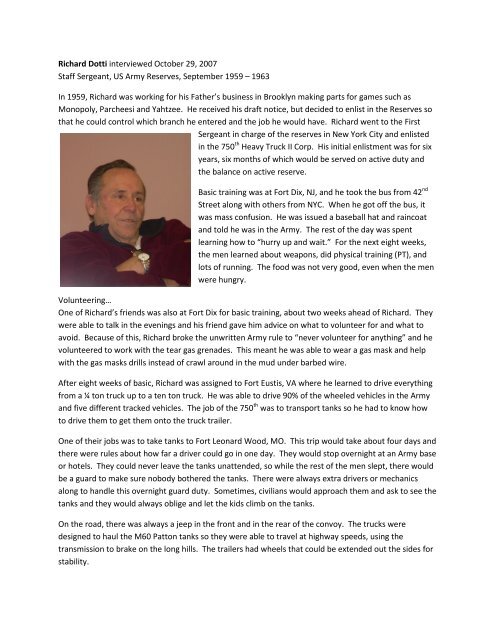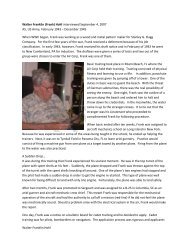Richard Dotti interviewed October 29, 2007 Staff Sergeant, US Army ...
Richard Dotti interviewed October 29, 2007 Staff Sergeant, US Army ...
Richard Dotti interviewed October 29, 2007 Staff Sergeant, US Army ...
- No tags were found...
You also want an ePaper? Increase the reach of your titles
YUMPU automatically turns print PDFs into web optimized ePapers that Google loves.
<strong>Richard</strong> <strong>Dotti</strong> <strong>interviewed</strong> <strong>October</strong> <strong>29</strong>, <strong>2007</strong><strong>Staff</strong> <strong>Sergeant</strong>, <strong>US</strong> <strong>Army</strong> Reserves, September 1959 – 1963In 1959, <strong>Richard</strong> was working for his Father’s business in Brooklyn making parts for games such asMonopoly, Parcheesi and Yahtzee. He received his draft notice, but decided to enlist in the Reserves sothat he could control which branch he entered and the job he would have. <strong>Richard</strong> went to the First<strong>Sergeant</strong> in charge of the reserves in New York City and enlistedin the 750 th Heavy Truck II Corp. His initial enlistment was for sixyears, six months of which would be served on active duty andthe balance on active reserve.Basic training was at Fort Dix, NJ, and he took the bus from 42 ndStreet along with others from NYC. When he got off the bus, itwas mass confusion. He was issued a baseball hat and raincoatand told he was in the <strong>Army</strong>. The rest of the day was spentlearning how to “hurry up and wait.” For the next eight weeks,the men learned about weapons, did physical training (PT), andlots of running. The food was not very good, even when the menwere hungry.Volunteering…One of <strong>Richard</strong>’s friends was also at Fort Dix for basic training, about two weeks ahead of <strong>Richard</strong>. Theywere able to talk in the evenings and his friend gave him advice on what to volunteer for and what toavoid. Because of this, <strong>Richard</strong> broke the unwritten <strong>Army</strong> rule to “never volunteer for anything” and hevolunteered to work with the tear gas grenades. This meant he was able to wear a gas mask and helpwith the gas masks drills instead of crawl around in the mud under barbed wire.After eight weeks of basic, <strong>Richard</strong> was assigned to Fort Eustis, VA where he learned to drive everythingfrom a ¼ ton truck up to a ten ton truck. He was able to drive 90% of the wheeled vehicles in the <strong>Army</strong>and five different tracked vehicles. The job of the 750 th was to transport tanks so he had to know howto drive them to get them onto the truck trailer.One of their jobs was to take tanks to Fort Leonard Wood, MO. This trip would take about four days andthere were rules about how far a driver could go in one day. They would stop overnight at an <strong>Army</strong> baseor hotels. They could never leave the tanks unattended, so while the rest of the men slept, there wouldbe a guard to make sure nobody bothered the tanks. There were always extra drivers or mechanicsalong to handle this overnight guard duty. Sometimes, civilians would approach them and ask to see thetanks and they would always oblige and let the kids climb on the tanks.On the road, there was always a jeep in the front and in the rear of the convoy. The trucks weredesigned to haul the M60 Patton tanks so they were able to travel at highway speeds, using thetransmission to brake on the long hills. The trailers had wheels that could be extended out the sides forstability.
During his time at Fort Eustis, <strong>Richard</strong> kept his ’59 Chevy convertible off base. The man who owned theparking lot where he kept his car was Greek. <strong>Richard</strong>’s best friend was Greek so <strong>Richard</strong> knew some ofthe symbols. He noticed a cross with a rose in the middle so <strong>Richard</strong> observed that he must be from theisland of Rhodes. The man asked how he knew that and <strong>Richard</strong> explained. After that, <strong>Richard</strong>’s car waskept under a lean-to next to the owner’s office.Eustis was near Williamsburg, VA where the College of William and Mary had a dating policy for the<strong>Army</strong>. At that time, the men could go over to thesororities and sit in a row on the couches and theyoung women would come down the stairs and ifthey saw someone they liked, they would go out ona date with them. They had to be back by 10 at nightduring the week and 11 on weekends. If someonemissed the curfew, that was the end of dating there.One shock to the men of the 750 th was the Jim Crowlaws of the south. In New York City, these laws didnot exist and people made friends regardless of thecolor of their skin. But in the south, there weresome restaurants where blacks couldn’t go and somewhere whites couldn’t go. At one black restaurant,<strong>Richard</strong> had to be served in the kitchen because hewasn’t allowed to sit in the front.<strong>Richard</strong> <strong>Dotti</strong> setting up his room at Fort Eustis,March 1960Recalled to Active Duty…After four months at Eustis, <strong>Richard</strong>’s active duty time was up and he was released to the Reserves. Hehad to wait until 12:01 A.M. the next day to start home since his active duty time did not end untilmidnight! Reserves consisted of one meeting a week and two weeks of training in the summer. Thiscontinued until <strong>October</strong> 1961. The Berlin Wall had recently been erected. <strong>Richard</strong> was at the movieswatching The Ten Commandments when he bought a paper during intermission and read that the 750 thHeavy Truck II Corp had been activated because of the Berlin crisis. The men of the 750 th reported toFort Dix, were issued new uniforms and then headed to for Devens, MA. Their job was to replace a TankTransport unit that had been shipped to Germany.Fort Devens is the coldest place in Massachusetts according to <strong>Richard</strong>. They were issued winter coats,“Mickey Mouse” boots (white rubber boots) and other cold weather gear. By now, <strong>Richard</strong> was a Buck<strong>Sergeant</strong> and he was told he had to go to NCO Academy. <strong>Richard</strong> asked what he had to do to get out ofgoing. After some checking, <strong>Richard</strong> was given the option of being busted down a rank to Specialistwhich he agreed to do. Now, he was able to go to Mechanics School at the Aberdeen Proving Groundsin Maryland. The school was both classroom and hands-on for everything having to do with mechanics.It was fourteen weeks long and after about six weeks, he got his Buck <strong>Sergeant</strong> stripes back.
Once back at Fort Devens, he was promoted to E6 and put in charge of the maintenance section of themotor pool. Now, <strong>Richard</strong> had a jeep and freedom. He enjoyed this time because he had good menworking for him and he was able to do his job.A Brutally Cold Ride…One time, there was a call for volunteers to drive dump trucks down to Brooklyn so they could be loadedon ships for Vietnam. <strong>Richard</strong> wanted to see his family living in New York City so he volunteered. <strong>Army</strong>vehicles didn’t have heaters and it was winter and the windshields had already been strapped down tothe hood in preparation for shipping. This meant that <strong>Richard</strong> had to drive 55 mph, in winter, without awindshield. Despite a parka, goggles, mask, gloves with liners and any other piece of clothing he couldwear, it was the coldest he had ever been. When he arrived in Brooklyn, all he wanted to do was drinksomething hot. After visiting with his family, the trip back to Fort Devens was made in the back of atruck, but this was comfortable compared to the trip down.Part of the duty at Devens was to deliver vehicles, that had been repaired elsewhere, to Fort Drum, NY.On one trip, <strong>Richard</strong> discovered that the radiators were leaking so he pulled over and dug some beerand whiskey bottles out of the trash to hold water to re-fill the radiators. When he arrived at Fort Drum,in the rear of his column, he was met by the guard holding two of the empty bottles. The guard beganto make a comment about the men having whiskey and beer bottles and <strong>Richard</strong> said “I know, I gavethem the bottles so they could keep the radiators filled with water.”In August of 1962, the 750 th was released from active duty. President Kennedy had signed an orderallowing Reservists who had been called to active duty to end their Reserve obligation at this time. But,<strong>Richard</strong>’s commander, a WWII Ranger veteran and <strong>Richard</strong>’s high school history teacher, asked <strong>Richard</strong>if he would stay until the end of his original enlistment which he agreed to do. One of the conditions ofhim staying was that his men be allowed to report to their weekly meetings in their work fatigues ratherthan Class A uniforms. This saved time when the men arrived and didn’t have to change and thenchange back before getting to work on the vehicles. One night, an inspector came in and saw that<strong>Richard</strong> was not in his Class A uniform at the opening formation. He proceeded to chew <strong>Richard</strong> out infront of the men. When he was finished, <strong>Richard</strong> thanked him for his input and resigned fromthe Reserves.While <strong>Richard</strong> could not believe the waste and inefficiency of the <strong>Army</strong>, he never regretted enlisting. Hewas proud to serve his country and sees military service as a small sacrifice to the country that has givenus so much.





